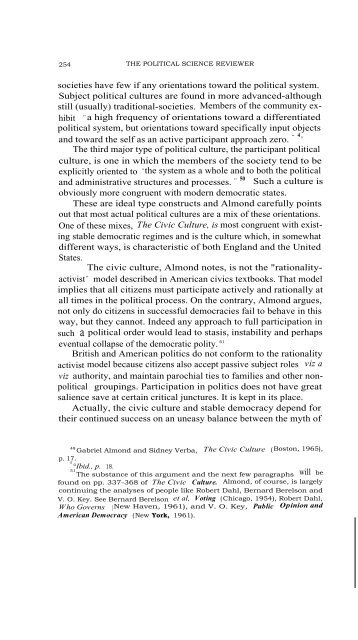FUNCTIONALISM AND ITS CRITICS - Intercollegiate Studies Institute
FUNCTIONALISM AND ITS CRITICS - Intercollegiate Studies Institute
FUNCTIONALISM AND ITS CRITICS - Intercollegiate Studies Institute
You also want an ePaper? Increase the reach of your titles
YUMPU automatically turns print PDFs into web optimized ePapers that Google loves.
254<br />
THE POLITICAL SCIENCE REVIEWER<br />
societies have few if any orientations toward the political system.<br />
Subject political cultures are found in more advanced-although<br />
still (usually) traditional-societies. Members of the community exhibit<br />
"a high frequency of orientations toward a differentiated<br />
political system, but orientations toward specifically input objects<br />
and toward the self as an active participant approach zero. " 4 °<br />
The third major type of political culture, the participant political<br />
culture, is one in which the members of the society tend to be<br />
explicitly oriented to "the system as a whole and to both the political<br />
and administrative structures and processes. " 50 Such a culture is<br />
obviously more congruent with modern democratic states.<br />
These are ideal type constructs and Almond carefully points<br />
out that most actual political cultures are a mix of these orientations.<br />
One of these mixes, The Civic Culture, is most congruent with existing<br />
stable democratic regimes and is the culture which, in somewhat<br />
different ways, is characteristic of both England and the United<br />
States.<br />
The civic culture, Almond notes, is not the "rationalityactivist<br />
" model described in American civics textbooks. That model<br />
implies that all citizens must participate actively and rationally at<br />
all times in the political process. On the contrary, Almond argues,<br />
not only do citizens in successful democracies fail to behave in this<br />
way, but they cannot. Indeed any approach to full participation in<br />
such a political order would lead to stasis, instability and perhaps<br />
eventual collapse of the democratic polity. 61<br />
British and American politics do not conform to the rationality<br />
activist model because citizens also accept passive subject roles viz a<br />
viz authority, and maintain parochial ties to families and other nonpolitical<br />
groupings. Participation in politics does not have great<br />
salience save at certain critical junctures. It is kept in its place.<br />
Actually, the civic culture and stable democracy depend for<br />
their continued success on an uneasy balance between the myth of<br />
p. 17.<br />
5<br />
49 Gabriel Almond and Sidney Verba, The Civic Culture ( Boston, 1965),<br />
°Ibid., p. 18.<br />
51<br />
The substance of this argument and the next few paragraphs will be<br />
found on pp. 337-368 of The Civic Culture. Almond, of course, is largely<br />
continuing the analyses of people like Robert Dahl, Bernard Berelson and<br />
V. O. Key. See Bernard Berelson et al, Voting ( Chicago, 1954), Robert Dahl,<br />
Who Governs (New Haven, 1961), and V. O. Key, Public Opinion and<br />
American Democracy ( New York, 1961).
















